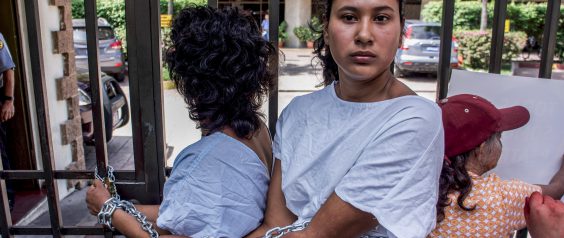Sticks, Stones and Laws When Women Speak Out About Their Reproductive Rights
by Dina Meza / June 9, 2017 / Comments Off on Sticks, Stones and Laws When Women Speak Out About Their Reproductive Rights
Translated from Spanish by Katherine Wingfield-Dobbs.
The decriminalization of abortion requested by women’s organizations in Honduras caused a violent atmosphere against them in April and early May of this year.
It was evident that when women defend their rights, and even more so if they defend their sexual and reproductive rights, they stir up the sinister interests of diverse groups that are considered to have the power to decide on behalf of women.

- Honduras has one of the world’s highest murder rates. It is also one of the most dangerous countries to practice journalism, ranking 129th out of 180 in the 2014 World Press Freedom Index. Journalists are regularly threatened, attacked, and killed for their work. The Honduran government fails to punish those who use violence against reporters, essentially granting them impunity. This space will be dedicated to examining the lack of protection for Honduran journalists exercising their profession. Topics will include the use of state-sponsored advertising as a mechanism to reward or punish publications, and censorship and self-censorship as hindrances to democratic progress.

- Born in Cofradía, Honduras, Dina Meza has been recognized by PEN International, Amnesty International, Index on Censorship and Reporters without Borders for her work as a journalist and human rights advocate. Currently, Dina is the driving force behind the creation of Honduras PEN Centre. In 2013, she wrote “Reign of Terror,” an in-depth report on threats to Honduran journalists for Index on Censorship’s magazine. In 2014, she was named one of Reporters Without Borders’ “100 Heroes and Heroines of Information.”
Women petitioned the State of Honduras to approve the decriminalization of abortion for three reasons: sexual violation; when it puts the health and the life of the woman at risk, and when there are serious birth defects which are incompatible with life.
Within the framework of the coup d ‘ état, National Congress approved the criminalization of the use and distribution of Emergency Contraceptive Pills (ECPs). The Decree, which is injurious to the rights of women, was supported by the Supreme Court of Justice.
Alongside this system of violence against women, the State of Honduras, through National Congress, refuses to ratify the Optional Protocol of CEDAW , and to listen to the voices of women, instead the fundamentalist churches.
At a general level throughout the world, a group of experts from the UN said in September 2015 “the adoption of the UN 2030 Agenda for Sustainable development represents a unique opportunity to fight against inequalities and discrimination, including the elimination of laws, policies, and discriminatory practices, which are often located at the center of violations against women’s health and reproductive and sexual rights”.
In relation to Honduras it said that “to deny women and girls access to safe abortion services in cases of risk to the health of pregnant women or girls, rape or incest, or non-viability of the fetus, causes an excessive and irreversible physical and psychological suffering to many women and girls. It is also the most flagrant form of exploitation of women’s bodies and a denial of their autonomy”.
Erika Guevara-Rosas, Director for the Americas of Amnesty International, said that “by criminalizing abortion, the penal code of Honduras is incompatible with human rights and should be amended without delay”.
The problem in Honduras lies in how it addresses the issue whenever women want to put it on the table for public discussion. There is an obscurantist unit that moves at the speed of light and creates an environment of more violence against women.
They are the fundamentalist churches; the pro-life groups; the hypocritical politicians and the media who stigmatize women who speak out. The women’s cries are not heard denouncing the fact that violence against women is so strong, that femicides are a highly cruel method against the lives of women.
Weeks of media campaigns drew a blank: Parliament approved the continued criminalization of abortion as it has always been. Penalties range from three to ten years in prison for women who abort for any reason.
Discussions on the subject within the National Congress did not make use of scientific elements when debating it. In the end, the vote was 79 votes in favor of criminalization. The women were ignored, others decided for them.
But interesting things happened and other things which were reprehensible. Firstly, the topic was put up for public discussion like never before. You could see how the women took more strength and put aside the fear of being stigmatized. Among them were Christian women of different denominations grouped together in “Ecumenical Committees for the Right to Decide” – for the first time they let themselves be heard and raised directly that abortion is an issue which should be dealt with scientifically.
Their position made Honduran Cardinal Oscar Andrés Rodríguez rush to publish a statement insulting this group of women who peacefully demonstrated that “Christians do not stone women, we defend them”.
A horrific campaign was started prior to the decision of National Congress. Also, they were assaulted physically when they held a sit-in in the basement of Parliament hours before they were voting on the issue.
Ana Ruth García, leader of the Ecumenical Committees for the Right to Decide blamed the Government for this repression.
The courage of women faced with such brutality to silence their voices is admirable. Although there is a patriarchal system that wants to drown out their demands, these women forge ahead.
It is also remarkable how Christian women are not willing to withdraw from exercising their right to freedom of expression despite media campaigns, pressure calls and blackmail that the ecclesial hierarchy want to bring about.
But why are they so afraid to listen to women? In spite of this, they will continue to demand their rights… that is how it has been throughout history!!!





